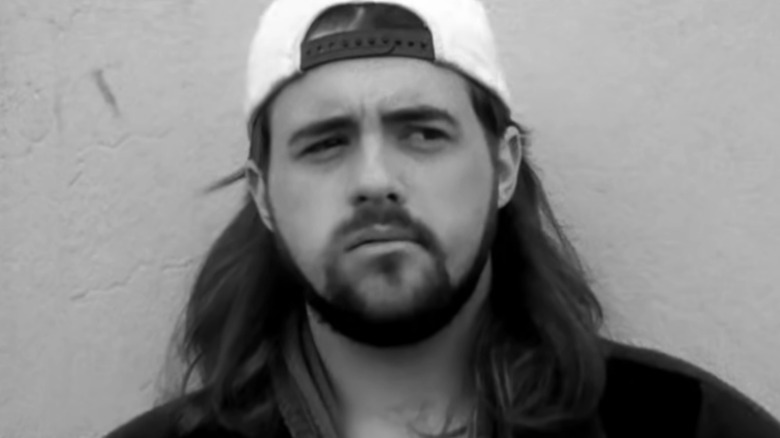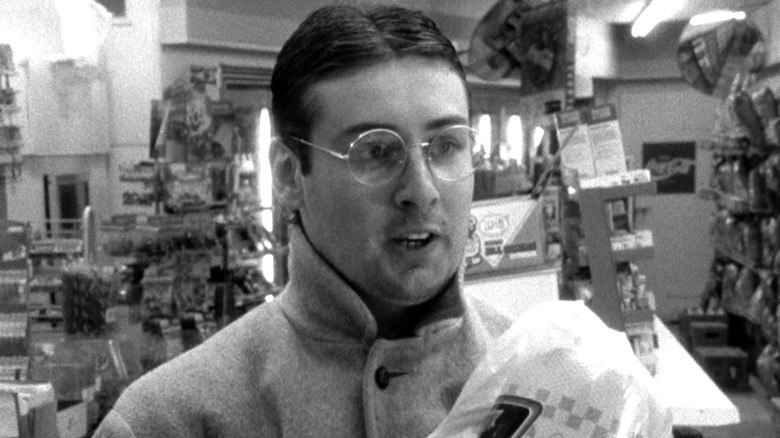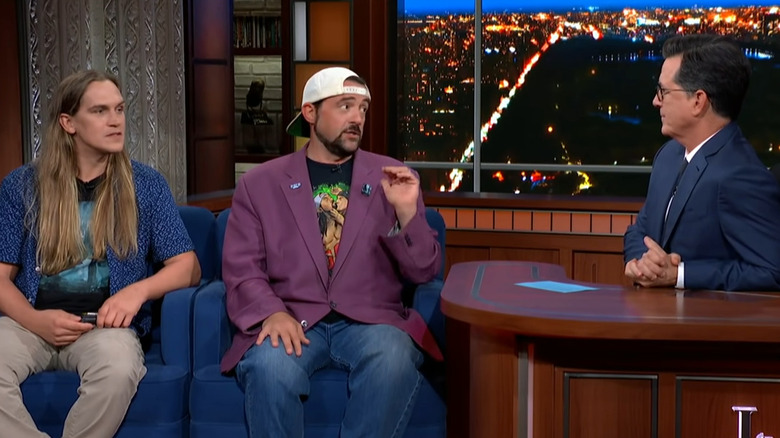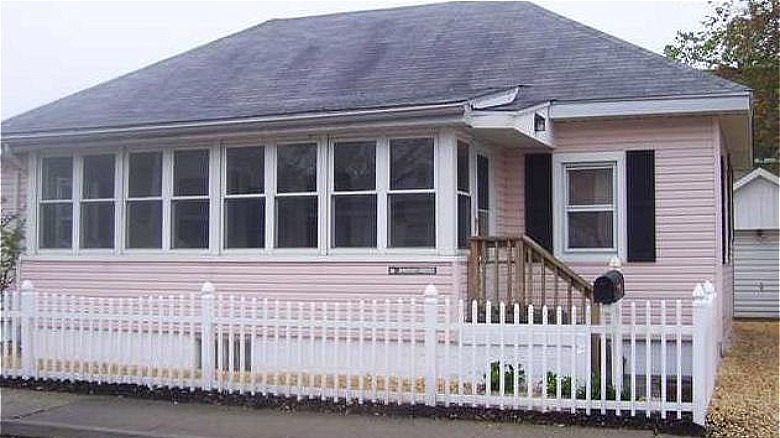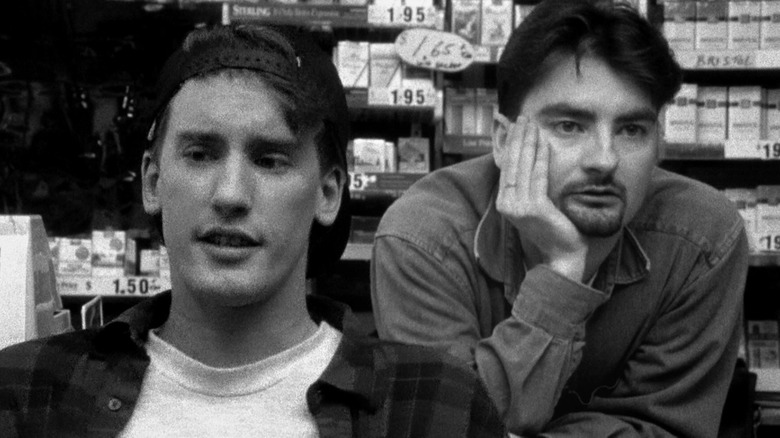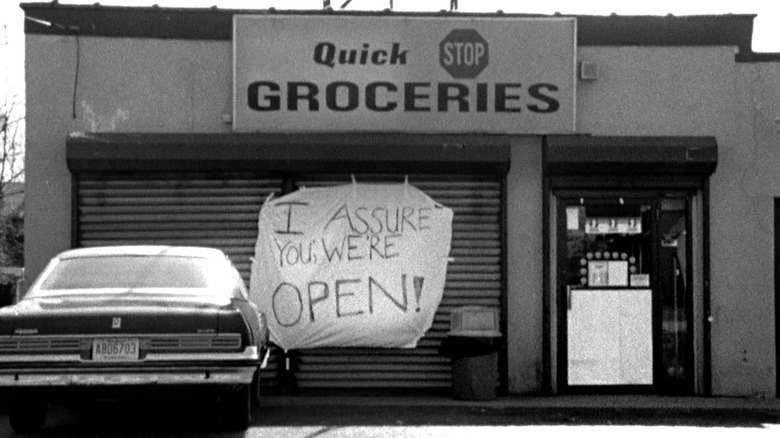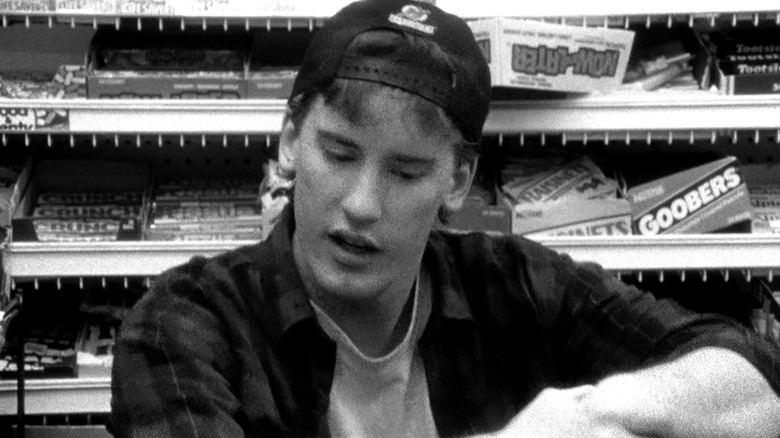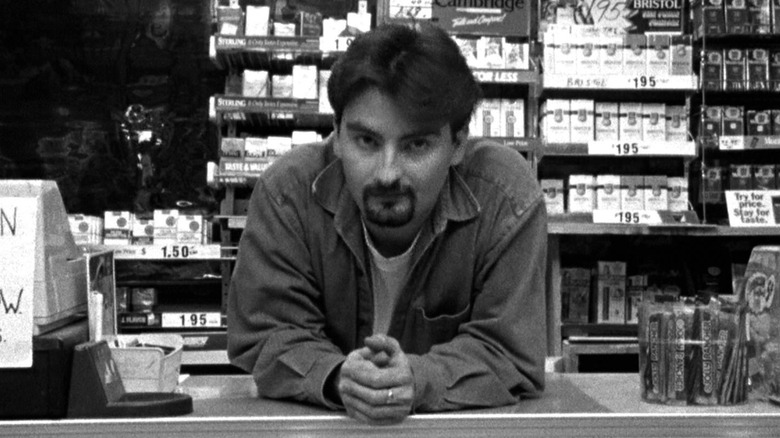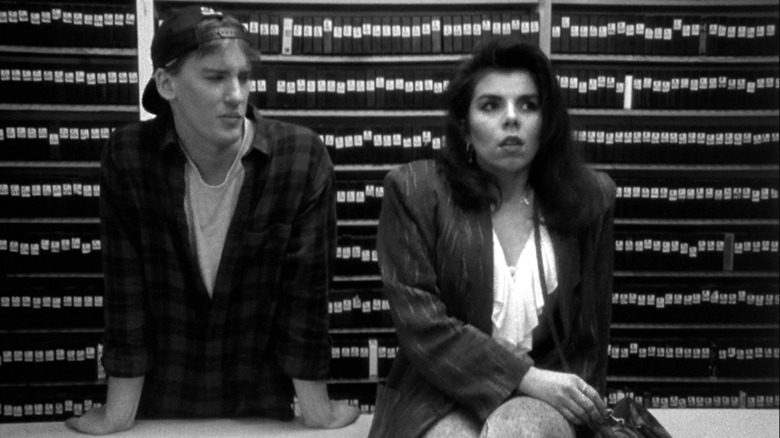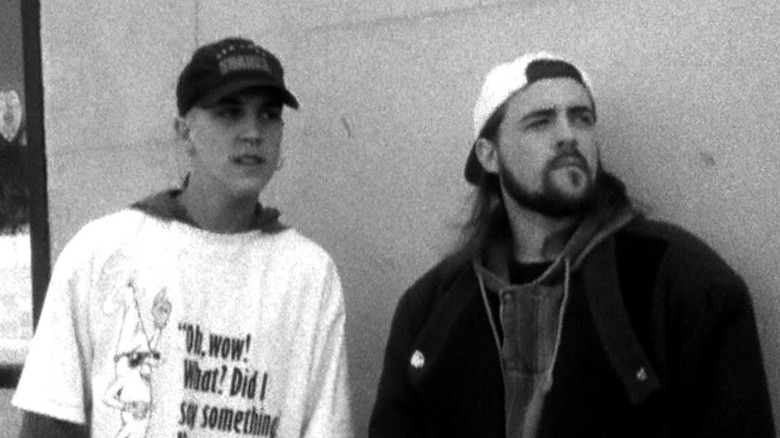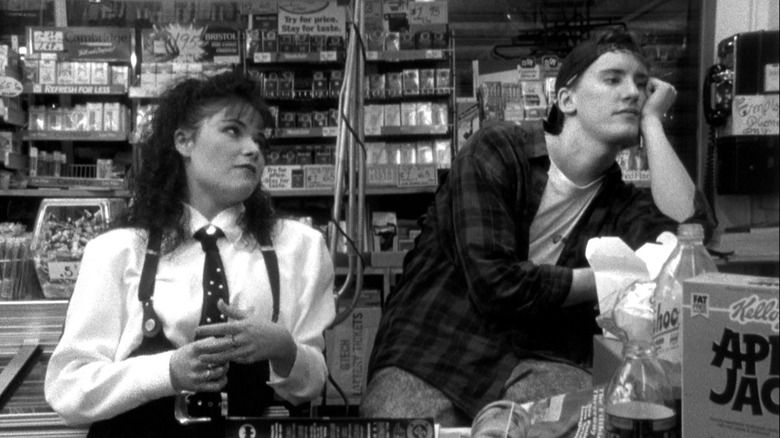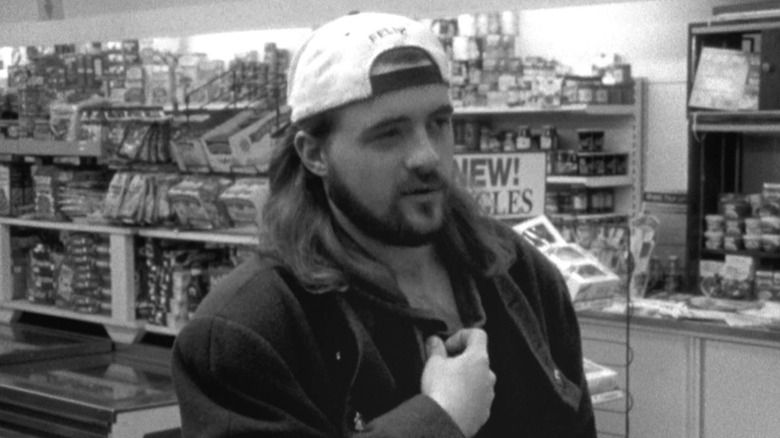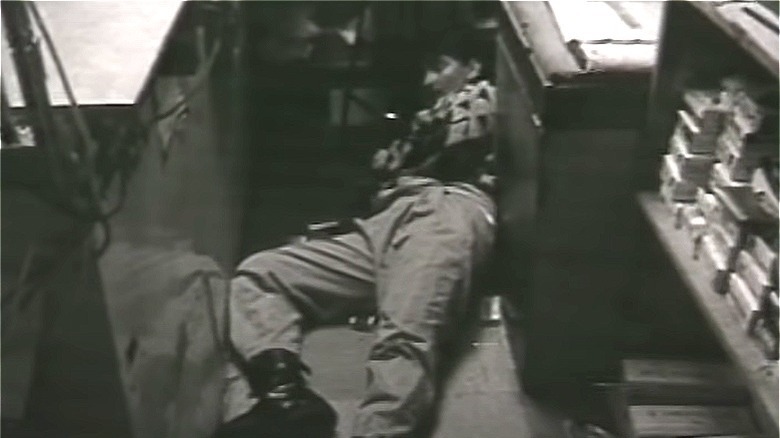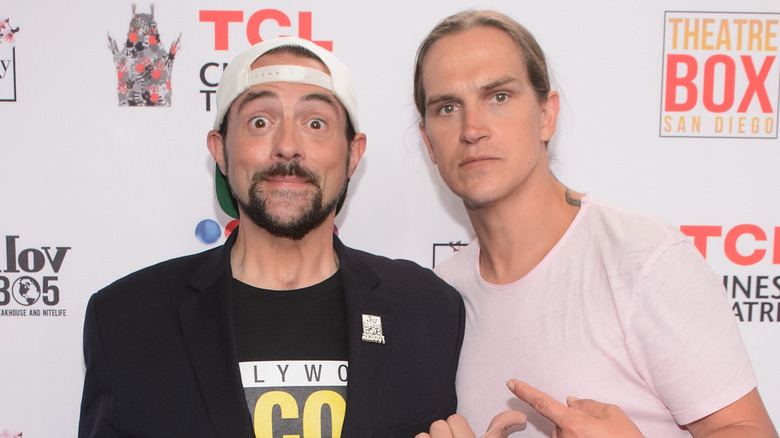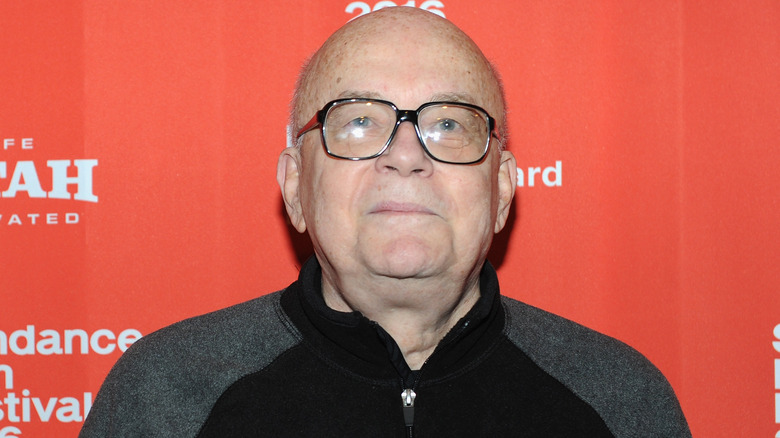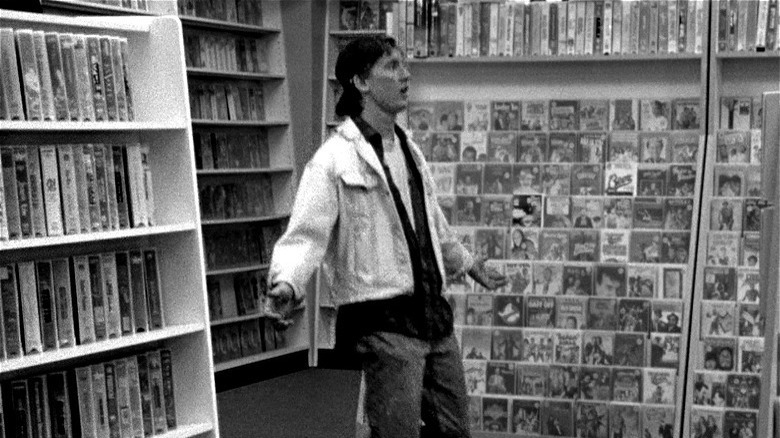The Untold Truth Of Clerks
View Askewniverse fans, rejoice! The trailer for "Clerks 3" is finally here! After many delays and setbacks, the latest movie from gonzo filmmaker Kevin Smith has, at last, made its presence known in a big way. And yes, we assure you, it looks worth the wait.
28 years have passed since Smith's debut flick about two slackers working mundane jobs at a convenience store and adjoining video store. Filled with foul-mouthed dialogue and irreverent humor, the first "Clerks" film seamlessly captured the spirit of Gen X'ers in the early 1990s. Much of the high praise for "Clerks" is thanks to its genuine-sounding dialogue, which can be attributed to the fact that Smith drew from real conversations that he'd had with his own friends.
With a budget of just $27,000, the "Clerks" cast and crew made one of the most defining films of their generation. Smith followed up the cult classic with a series of movies set in the same universe, including "Mallrats," "Dogma," and "Jay and Silent Bob Strike Back." The sequel, "Clerks 2," was released in 2006, although it fell short of the acclaim received by its predecessor. The making of "Clerks" has been a subject of fascination for amateur filmmakers and loyal Kevin Smith fans alike, but it was a long and hard road to becoming one of the most influential independent pictures of the '90s. Here are some behind-the-scenes tidbits that even die hard fans may have missed.
It was almost rated NC-17
"Clerks" is famously known for its long strings of dialogue peppered with exceedingly crude language. In fact, this trait has become a trademark of writer-director Kevin Smith's movies. Besides numerous casual uses of the "F" word, the characters in "Clerks" have explicit discussions that include detailed sex acts in between rudely brushing off customers. There is also a scene in which it is implied that a woman has sex with a dead man in the Quick Stop bathroom.
Although the movie was released in theaters with a hard "R" rating, the original ruling by the MPAA was for "Clerks" to be given a rating of NC-17. To fight this, Miramax hired lawyer Alan Dershowitz -– famed for his involvement in the 1994 OJ Simpson trial -– to contest the rating. "An NC-17 rating is the kiss of death," said Dershowitz (as per UPI). "There's no violence in this film. There's joking about sex the way kids working in a 7-Eleven would joke about sex." In the end, Miramax won the appeal, and "Clerks" was given an "R" rating.
Smith used to lie about why Clerks was black and white
Part of the appeal of "Clerks" for critics was the avant-garde style in which it was filmed. With their nearly non-existent budget, the crew had to adjust to make ends meet. Some of those cut corners including using a 16 mm SR-2 camera, cast members playing multiple roles, and limiting to late night shoots when the convenience store was closed. As for filming in black and white, the choice was a practical one rather than artistic. Simply put, it was cheaper to film in black and white rather than color.
However, it seems that at one time, Kevin Smith decided to take credit for an assumption made by one of the movie's reviews. In a 2019 appearance on "The Late Show with Stephen Colbert," Smith told the host, "There was some critic a long time ago that said like, 'It's almost as if, because the movie was shot in black and white, the movie was shot from the perspective of the store security camera.' And then every interview I did after that I'd be like, 'We shot it in black and white because we wanted it to seem like it was shot from the store security camera.'" Of course now we know better, but it makes sense that a young Kevin Smith would wish to seem like a creative force worthy of the indie film scene.
A natural disaster helped to fund the making of Clerks
Making movies is expensive. Big name franchises like the MCU have spent up to $400 million to fund their titles, but the gargantuan profits they've raked in have made it worth spending that much dough. Yet there is not as much risk involved when making movies with a major studio, as there is with, say, making a movie with a bunch of your friends over a few weeks on a shoestring budget.
According to the View Askew website, funds for "Clerks" came from a variety of sources, including maxing out several credit cards, Smith's wages from his own convenience store job, and the money he made from selling his comic book collection. Additionally, fans may be surprised to learn that financial aid also came from one unfortunate event in the young filmmaker's life.
In 2012, Smith shared a story on his Facebook profile about a storm in 1992 that flooded his home and destroyed a number of his most valuable possessions, including two cars owned by himself and Jason Mewes. However, shortly after, the Federal Emergency Management Agency (or FEMA) stepped in to aid the residents of the small city of Leonardo, New Jersey. Smith received an excited phone call from his friend and co-star, Mewes, relating that the government agency had given them $4000 to help cover their losses. "I went car-less for awhile and sunk my half of that four thousand bucks into 'Clerks,'" Smith recalled, "which we started shooting three months later in March of 1993, thanks in no small part to FEMA."
How Clerks got its name
Seeing as the movie "Clerks" is all about clerks, it might seem like the obvious title choice. Yet Smith and his crew workshopped a few titles before settling on the one-word moniker. In 2004, a special edition DVD dubbed "Clerks X" was released to commemorate its 10-year anniversary. Along with a plethora of special features, the three disc set included a documentary titled "Snowball Effect. The Story of Clerks."
The behind-the-scenes feature included interviews with the cast and crew and offered interesting tidbits about the movie for die-hard fans. On the subject of how the name "Clerks" was chosen, Kevin Smith revealed: "The original title to the movie was a very clever pun on words, and it was called 'Inconvenience.' And [Vincent Pereira] was smart enough to be like, 'dude, that's a little corny, don't you think?'"
Pereira was Smith's co-worker at the Quick Stop who joined on as the crew camera assistant and grip, as well as being credited with "cat wrangler." Pereira suggested the title of "Rude Clerks" to replace "Inconvenience," which finally evolved to just "Clerks."
The shutters being closed had a practical reason
One of the biggest running gags in the "Clerks" movie, as well as its sequel, "Clerks 2," is the giant sign posted on the closed shutters of the Quick Stop storefront. As Dante goes into work in the morning, he is frustrated to find that the shutters' padlock has been sealed with gum by local pranksters. Dante then improvises a slapdash sign made on a large sheet and written in shoe polish, which reads: "I assure you, we're open!" As a result, Dante must muddle through the rest of his shift as friends and customers alike remark that he smells like shoe polish.
This inconvenience begins the perpetual slide of Dante's terrible day and makes for a funny gag, but it also was rooted in practicality, as revealed on the "Clerks" DVD commentary (via Film School Rejects). During the filming of "Clerks," Kevin Smith was actually employed at the real Quick Stop convenience store, and was given permission to film there by the store's owners on the condition that the crew was only allowed to shoot after closing. To avoid potential confusion among real-life customers, the shutters would have to remain closed, and so Smith came up with the idea to add the gunked-up padlocks to the script. This also helped with budgeting, as the closed shutters story device eliminated the need for extra lighting.
Kevin Smith was originally going to play Randal
It isn't unheard of for filmmakers to write, direct, and star in their films themselves. Orsen Welles, Roberto Benigni, Billy Bob Thornton, and "Good Will Hunting" team Ben Affleck and Matt Damon are just a handful of examples who have done just that –- and it earned them all Oscars. (Okay, the likelihood of a Kevin Smith movie winning an Academy Award is extremely low, but you get the idea.)
Before production officially began for "Clerks," writer and director Smith initially planned on playing the role of Randal Graves himself. While holding auditions for the movie, Smith's longtime friend, Jeff Anderson, decided to come and read lines for the character of Jay as a joke. Though he spent his time chuckling his way through the script and flubbing line after line, Anderson nonetheless made an impression on Smith. He asked Anderson to read for the part of Randal, and soon after offered him the role. Smith reason that Anderson fit the role, but also, Smith would not have to memorize all that dialogue himself (per "Snowball Effect. The Story of Clerks").
The original actor for Dante was replaced for being lousy
Randal Graves wasn't the only character to be recast in "Clerks." Initially, Kevin Smith's buddy Ernest "Ernie" O'Donnell was set to play Dante Hicks, the film's lead, long before Brian O'Halloran landed the part. O'Donnell and Smith were close friends in school, and thanks to O'Donnell's theater background, he was Smith's first choice. However, once auditions were underway, Smith and other members of the cast and crew began to have doubts about O'Donnell.
According to various cast and crew members, O'Donnell frequently stumbled over his lines during readings and failed to memorize the dialogue. However, for Smith, that wasn't the biggest issue. "The problem was that Ernie's read of the character was not the character," Smith related in "Snowball Effect. The Story of Clerks." "Dante was a schlub. He's an everyman, he's Charlie Brown." Apparently, the two had creative differences in how the lead role should be portrayed. Eventually, O'Halloran -– who thoroughly impressed the crew at auditions –- took over as Dante, and O'Donnell was given the role of obnoxious trainer Rick Derris, who makes a brief appearance in the film to criticize Dante's lack of muscle.
There was serious tension between Marilyn Ghigliotti and Jeff Anderson
While making a movie on a tight budget, in a single confined space, and working through the late-night hours into early morning, there is bound to be some tension during the production process. Though most of the "Clerks" gang were friends long before filming began, there were a few in the group who had their grievances with others on the set. One of them was Marilyn Ghigliotti, who played Dante's girlfriend, Veronica.
According to Jeff Anderson, Ghigliotti singled him out during a post-rehearsal rap session to criticize his ability to do the job. She cited his lack of experience as a key factor, as well as his lack of confidence, and insinuated that he was not right for the part. This bold statement resulted in Anderson nearly quitting the project, but he was convinced by Smith to stay on.
When asked about the incident, Ghigliotti denied it. "It would be so out of character for me to actually say something out loud like that," she said in "Snowball Effect. The Story of Clerks." "I don't think I would have said that. That's like, shame on me if I did."
Jason Mewes was surprisingly camera shy
It's hard to name more legendary cinematic duos than Jay and Silent Bob. These "hetero lifemates" have been a staple of the View Askewniverse since their first appearance in the movie "Clerks," and they have continued to dance their way into our hearts via perpetually crude humor and cannabis jokes. There is no Jay without Silent Bob (and vice versa) just as there is no Statler without Waldorf, no Tom without Jerry, no peanut butter without jelly ... okay, you get the idea.
As Kevin Smith has said many times through various sources, the character of Jay is based on his pal, Jason Mewes, who also plays the character on screen. However, it was tougher than expected for Mewes to embody his stoner counterpart. While making "Clerks," Mewes had trouble performing in front of members of the crew while cameras were rolling. In the Q&A DVD series, "An Evening with Kevin Smith," the writer-director once relayed an anecdote in which he described the process of shooting with Mewes.
"We're about to do this sequence where we just kind of break into dance in front of the store, and Mewes is like, 'I can't do it,'" Smith relates. "I said, 'Why?' And he said, 'It's just like, all these people.'" To combat Mewes' stage fright, the camera crew pressed record and then left the site so that Mewes could perform his scene without everyone's eyes on him. The tale brings new context to the adage, "Dance like no one is watching."
Jeff Anderson married his co-star Lisa Spoonauer
Besides the fact that he has to work on his day off, Dante's other big gripe concerns his on-again, off-again relationship with Caitlin Bree. He and Randal have several conversations on the topic of Caitlin's recent engagement, and Dante's grievance that she failed to tell him about it. The much-discussed object of Dante's affection doesn't make an appearance until the third act of "Clerks," when she arrives at the Quick Stop to try and reconcile things between her and Dante.
Like most members of the cast, "Clerks" was the first film for actor Lisa Spoonauer, who played Caitlin. Though she played Dante's love interest, there was undeniable chemistry between Spoonauer and Jeff Anderson. The two began a relationship during filming, as revealed on "Smodcast," and married in 1998, though they divorced amicably in 1999.
Spoonauer reportedly dealt with chronic degenerative disease for many years, and died in 2017 at age 44. Upon hearing the news, Kevin Smith paid tribute to Spoonauer on his Instagram. "Lisa quickly became one of the most important people I'd ever meet," Smith wrote. "Thank you for dreaming my dream with me. You changed my life, Lisa."
Silent Bob's one line in the movie wasn't supposed to happen
Although the character of Silent Bob is notorious for his mostly muted role, he does occasionally offer words of wisdom. It all started in "Clerks," in which the character maintains his silence until one of the final scenes in the movie. As Dante is mourning his last chance of finding happiness with his ex, Caitlin, both Jay and Silent Bob point out that Veronica has been a faithful companion all along. "You know, there's a million fine looking women in the world, but they don't all bring you lasagna at work," the trench coat-wearing sage says. "Most of them just cheat on you."
This trend of Silent Bob offering rare pieces of advice recurred in other films of the View Askewniverse, but fans may be surprised to learn that this was not the writer's intention at the beginning. In fact, in the original script, the entire speech was written for Jay's character. According to Kevin Smith in "Snowball Effect. The Story of Clerks," Jason Mewes had trouble getting the words out, so Smith decided to take the last line of dialogue for himself. What resulted is an important aspect of the Silent Bob character, who only speaks when the scene calls for it.
The alternate ending that was cut from the movie
"Clerks" ends rather appropriately, as Randal saunters out the door, and Dante takes stock of the day's events. Randal then tosses the giant sheet to Dante with the proclamation, "You're closed," and the end credits roll. However, it wasn't always supposed to end that way. In fact, Kevin Smith had a much dark conclusion for "Clerks" in mind.
The original ending of "Clerks" (which Smith has appropriately dubbed "The Snyder Cut,") follows an ominous POV camera outside of the Quick Stop, which slowly treads toward the front entrance. The unseen figure then enters and walks up to the counter to face Dante, who informs them that the store is closed. The camera then cuts to a man who points a gun at Dante and shoots him, before stealing the cash from the register. The final shot is a close up of Dante's lifeless body on the floor. This ending to an otherwise light comedy is jarring and out-of-place, which is likely why it was cut out of the final version of the film.
Almost nobody showed up to the premiere
After all of the hard work and obstacles that the cast and crew had to endure, the day of the "Clerks" premiere had finally arrived. As recounted in ""Snowball Effect. The Story of Clerks," the premiere was set to take place at the Angelika Film Center in Greenwich Village, New York City, where Kevin Smith had gone to see many independent films that inspired his own filmmaking career. "Clerks" was scheduled to play on the last day of the theater's annual Independent Feature Film Market. Unfortunately, when they arrived at the theater, they were met with a nearly empty house.
"It was a f******* ghost town," Smith would later recall. Little did the crew realize at the time that their time slot — a Sunday at 11:00 AM –- was not ideal. "There was a couple of young people, and there was an old guy in front of us," recalled producer Scott Mosier. "We realized that we kind of got the s*** position." It was enough for everyone involved with "Clerks" to feel as though all of their work had been for naught. However, things took an unexpected turn, as the "old guy" in the theater would turn out to be the film's savior.
Word of mouth saved Clerks
As it turned out, the "old guy" in the theater at the "Clerks" premiere was none other than Bob Hawk, a consultant for the Independent Feature Film Market. Hawk had been part of the independent film scene for many years, and when he attended the screening for "Clerks," he knew it was something special. Shortly after viewing the film, Hawk spoke to Village Voice writer, Amy Taubin, who wrote a glowing review of the film (per The New York Times).
Like an old-fashioned game of telephone, word about "Clerks" began to spread. Smith began to receive calls from some big names in the business, including producer John Pierson and Mark Tusk of Miramax Films. All it took was the one right person seeing "Clerks" to get Smith and friends' dream project off the ground. "Without that screening — and Bob Hawk being AT that screening — none of you ever would've seen the flick," Smith wrote on the View Askew website in 2004. "And I'd still be working at Quick Stop, no doubt." We're glad it didn't turn out that way, Mr. Smith.
Clerks is in the Library of Congress's National Film Registry
One of the biggest honors for any filmmaker, besides an Academy Award, is to have their movie listed in the National Film Registry. The American institute, headed by the Library of Congress, is a preservation of movies that have had a significant impact on American art and culture. Requirements to be nominated for the Registry include that the film must be at least 10 years old, and "culturally, historically, or aesthetically significant."
In 2019, a group of loyal fans banded together online to nominate "Clerks" for a place in the Registry. They succeeded, and "Clerks" was one of 25 films chosen, among other titles such as "Purple Rain," "Amadeus," "Boys Don't Cry," and "Old Yeller" (per CBS). In response to the news, Smith wrote on Twitter: "The kid who made CLERKS would be stunned stupid if he knew his dopey l'il 'film' made it into A library, let alone the Library of Congress!" It only goes to show that a movie filled with curse words and descriptions of graphic sex acts can have a lot to say about American culture — for better or worse.
